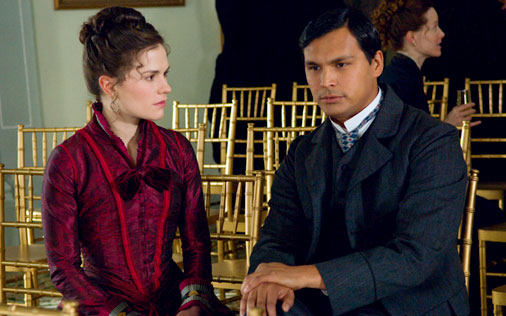HBO's 'Bury My Heart at Wounded Knee' is more dutiful than inspired, but there's always the book.
But even a bad historical film on a good subject may make you want to learn more, if only by getting you to ask yourself, "Could it possibly have happened that way?" If HBO's version of "Wounded Knee"—which is not really a bad film, just an average one of its kind, earnest, dutiful, oversimplified, underdeveloped, weighted down in exposition and by turns intriguing, melodramatic and dull—does nothing more than send a few more people to Brown's book, that may be all the credit in heaven it needs.
HBO movie depicts the slow, brutal death of a once-proud race
Considering what made Brown’s book such a revisionist revelation upon its release—the overdue novelty of steadfastly hewing to the poetic words and bitter remembrances of sympathetic Native Americans, after years of popular history depicting them as savages—this is a sticky element for anybody attempting to faithfully evoke the book’s we-were-screwed importance. Of the three prongs in the crisscrossing narrative—Sitting Bull, Dawes and Eastman—only Sitting Bull’s scenes feel like they capture the ugly dehumanization Brown was after. Whenever the focus is Eastman, who goes from well-intentioned policy collaborator with Dawes to reservation doctor, and watches firsthand how America’s ramshackle recruitment of Indians toward a “civilized” way of life is actually killing them, the movie develops a curious remove, despite Beach’s best efforts to communicate anguish. (You just don’t worry as much for the degreed doctor as you do for a Sioux uprooted from everything he knows.)
Despite its good intentions, "Bury My Heart at Wounded Knee" tries to jam too much history and significance into too small a space. For instance, the entire prickly issue of whether the Sioux were a predatory people who took their sacred Black Hills territory from the Crow—and, trust me, I've heard that question debated by members of both tribes, and as a white person you wouldn't want to touch it with a 10-foot lance—is compressed into a few lines of dialogue between Sitting Bull and Colonel Miles (played by a grim-visage Shaun Johnston). Insults, humiliations, and atrocities to the American Indians become so common that the conflagration at Wounded Knee seems almost anticlimactic. (Mr. Simoneau's restraint in the Wounded Knee scenes is in sharp contrast to Joe Johnston's horrific imagery of the slaughter in 2004's "Hidalgo.")


No comments:
Post a Comment